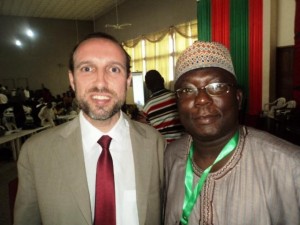For three days beginning from Monday July 22, 2013, stakeholders involved in the Nigerian REDD+ Readiness project will gather for a crucial meeting in Abuja, the Federal Capital City, to tidy up the scheme’s Readiness Preparation Proposal (R-PP).

The R-PP should be ready in time for submission on or before July 31, 2013 if the country hopes to secure an engagement with the Forest Carbon Partnership Facility (FCPF) and access a grant of up to $3.6 million.
REDD+ implies Reducing Emissions from Deforestation and forest Degradation plus conservation, sustainable management of forests and enhancement of forest carbon stocks. Just like the UN-REDD (United Nations Collaborative Programme on Reducing Emissions from Deforestation and Forest Degradation in Developing Countries), the FCPF is a window to finance the REDD+ programme. The UN-REDD is a collaboration involving the United Nations Development Programme (UNDP), United Nations Environment Programme (UNEP) and the Food and Agriculture Organisation of the United Nations (FAO).
A couple of years ago, Nigeria accessed a $4 million grant from the UN-REDD, giving birth to the nation’s first REDD+ Readiness Programme that is being implemented within a three-year span (commencing from late 2012), allowing Nigeria to craft the REDD+ mechanism through an innovative, two-track approach consisting of actions at both federal and state levels.
At the federal level, the programme will create basic technical capacities, develop strategic and policy frameworks for REDD+, and support the alignment of the country with international climate change and environmental negotiations and agreements. At the state level, the programme will conduct strategy-development and demonstration activities on REDD+ in Cross River State, which has shown a determined political commitment for green development as well as being home to more than 50 percent of the tropical high forest remaining in the country. The best practice and lessons learned in Cross River will be used to roll out REDD+ in other states across Nigeria.
However, the immediate task now is to get the R-PP finalised to meet next week’s deadline. Coordinator of the Nigerian REDD+ Programme, Salisu Dahiru, explains why the nation is seeking the FCPF financing.
His words: “In view of the scale of Nigeria and the complexity of developing a REDD+ system for the entire country, which has a federal structure with 36 states, the UN-REDD support needs to be coupled with additional financial and technical assistance, notably to reinforce the federal-level REDD+ capacities and to expand REDD+ to new states (using the best practice, models, policies and measures that Cross River State will develop and test). Nigeria is a member of the FCPF and FCPF co-financing seems necessary for the country to further its REDD+ process.
“Nigeria is accordingly preparing a new proposal for REDD+ readiness, on the basis of the analytical and planning efforts conducted so far, in order to mobilise concrete FCPF support. The FCPF requires new proposals to be submitted by 31st July 2013 (which is the last deadline for new countries). The potential FCPF support would serve to strengthening and completing REDD+ readiness at the federal level, as well as to engage at least two additional states into the REDD+ mechanism, using best practice and lessons from Cross River State.
“The basis for this R-PP proposal already exists, notably thanks to analytical work at the ‘Preliminary Assessment of the context for REDD+ in Nigeria’ (2010) and the planning and design work done for the UN-REDD National Programme for Nigeria (2012) – the latter actually constitutes a first, ad hoc version an R-PP. Furthermore, a first R-PP draft is being developed by the country.
“Currently the draft R-PP for Nigeria is under preparation by Nigeria with the support of the UNDP/REDD+ Africa team (based in Nairobi). However, on key matters, political decision will be made at this gathering.”
The forum will also discuss a work-plan for continuing the drafting and consultation of the Nigerian R-PP in the coming months, long after the first submission on 31st July.
